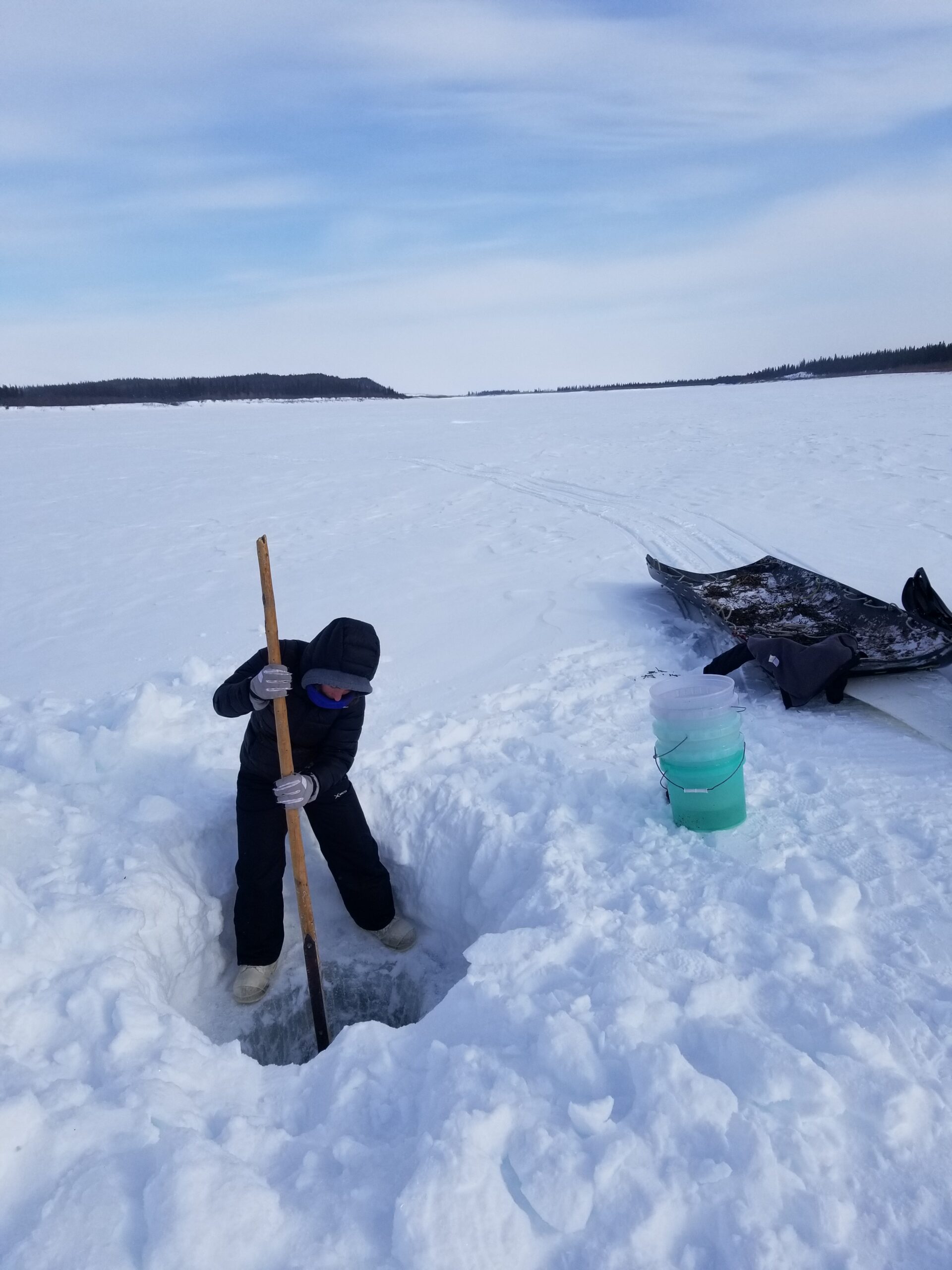
The Ambler con job
By Dawnell Smith
The Trump administration just made it clear who and what it prioritizes—not local concerns and U.S. citizens, but funneling federal money into an Australian and Canadian-owned mining promotor while promising to hand out permits for the Ambler road proposal that would put a private industrial road across over 200 miles of the southern Brooks Range of the Arctic.
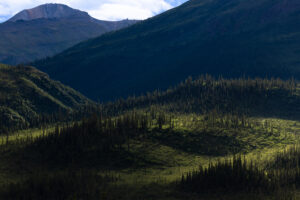
Evening light in the southern foothills of the Brooks Range near Atigun Pass. Credit: Lisa Hupp/USFWS.
This is no “Alaska grown” project.
In fact, the benefactors of the big bump in stock prices after Trump’s announcement on Oct. 6 were foreign owners and stockholders, including one of Trump’s major donors, who made tens of millions of dollars in one day.
Meanwhile, the administration ignored and sidelined the concerns and comments of local people along the project’s path and Americans who value those communities, clean water, and public lands.
Not to mention the bogus justification for ignoring Alaska communities by plunking the word “critical” before the word “mineral” and calling it a national security issue.
The real security issues here are the food resources and ways of life of local people. The real security issues are clean water, natural landscapes, and the health of living communities.
Another day, another attempt to bend the law.
The Trump administration claims it can issue permits across the board for the Ambler road under section 1106 of the Alaska National Interest Conservation Act, despite a prior 2024 Bureau of Land Management decision that concluded there would be significant impacts to subsistence and to the health of communities along the road corridor.
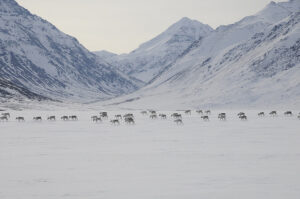
Western Arctic Caribou Herd in Gates of the Arctic National Park. Photo courtesy of NPS.
ANILCA has never been used in this way. Nor does Section 1106 negate the government’s legal obligations to laws like the Clean Water Act, the Federal Land Policy and Management Act, and other required work, such as identifying cultural resources along the road corridor. None of these things have been done or even begun.
“Strongarming a private road across the Brooks Range sure looks like an administration that decided it can’t do it the right way, so it will try the reckless way,” said Bridget Psarianos, senior staff attorney with Trustees for Alaska. “This administration seems to think it has spoken and therefore it is so, but that’s not how the law works or how decisions should be made. And that’s certainly not how we protect the health of Alaska and its communities. We will interrogate this effort to undermine local voices and established laws and again join partners in relentlessly opposing this effort to stifle the facts and people’s voices to enrich foreign mining interests.”
We took Trump’s 2020 decision approving Ambler to court and that litigation has been stayed after the Interior Department asked to go back and address some of its own legal errors. Following this revision, the U.S. Bureau of Land Management found it could not lawfully approve permits for the project because of its impacts on subsistence and local people. Other federal agencies’ permits are still suspended. Essentially, Trump just ordered the agencies to reinstate the very permits that are being challenged in our still-pending lawsuit.
The people who live there
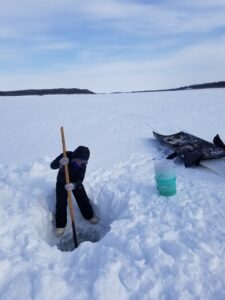
China Kantner chipping a water hole on the Kobuk River downriver from Ambler. Photo taken by Seth Kantner.
Local people from along the road corridor have opposed the proposed Ambler road and made their resolve clear.
“The federal government cannot claim to respect Tribal sovereignty while approving a project our people overwhelmingly oppose,” said Karmen Schaeffer Monigold with Protect the Kobuk. “This executive order retracts years of tribal consultation on the Ambler industrial road and is another tactic of colonization. This would be genocide of the Inupiaq culture and people. We call on decision-makers to listen to the people who live here — not to mining companies who will be gone in a few decades. Copper mining leaves the most waste out of any type of mining, naturally creates acid water that never goes away. This would be at the headwaters of the Kobuk River that seven communities are directly downriver from the mining district.”
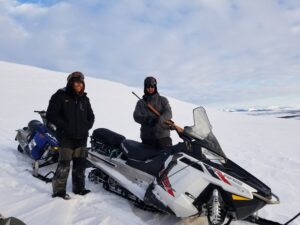
Elmer and Skylar Brown hunting caribou near Kotzebue. Photo by China Kantner.
China Kantner, who grew up in Kotzebue and along the Kobuk River below the village of Ambler said she grew up hunting caribou crossing that river and picking cranberries “ravenously.” Her dad and grandfather fished for salmon commercially and for their own food in Kotzebue Sound and she continues to gather food from the area today.
“The Ambler road has always loomed as a threat to this way of life,” she said. “That threat is only growing larger as the State of Alaska and our congresspeople in D.C. appear hell-bent on selling us out to line someone else’s pockets. What none of those folks can seem to understand is that we are already rich—rich in land, clean water, birds, caribou, fish and berries. Now more than ever as the caribou herd struggles and salmon return in smaller numbers, I believe we must defend what we have and the way of life that we love.”
Despite what corporate talking points say, extractive industries primarily employ people from other states to work on Alaska projects, and these industrial roads and mining operations exact a profound cultural, social, public health, and physical cost on communities by producing toxic waste, polluting air, water and land, and causing devastating social conditions, including sexual assault and violence towards women.
First Chief Frank Thompson of the Tanana Tribal Council said, “There is no evidence of significant critical minerals in the area. Ultimately the materials that would be mined will likely be going to China, and they will be the ones to benefit, and there will be very few jobs for Alaska Natives.”
The communities along the road corridor that would be directly impacted by this road and any mining operations that come of it know what’s at stake.
“The Trump administration has in ignored the will of more than 85 tribal governments,” said First Chief Julia Roberts Hyslop of the Tanana Tribal Council. “We are clear that the damages to our subsistence resources and culture resources will be horrendous and unavoidable. We will exercise all possible legal avenues to stop this road, which would be a death blow to our way of life.”
A sleight of hand…and words
One claim in the Trump administration’s Ambler bluster is that it somehow provides mineral “security,” but in fact, the unneeded minerals that would be wrenched from a thriving Arctic region would also need to go to China to be smelted. That’s right, the U.S. would be more dependent on China.
Another talking point is that Alaska is some “gold mine” to be exploited, but Alaska is a home, integral to our ways of life, and central to our way of caring for our children and their children’s children. One thing is clear—Trump views Alaska only as “gold mine” to be extracted for his billionaire donors.
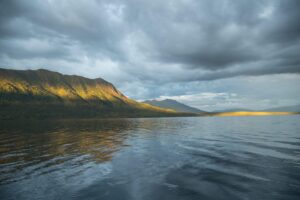
On the route for the proposed road to Ambler. Photo courtesy of Jamye Dittmar.
Meanwhile, other actions to push Ambler are underway. The road corridor would span hundreds of miles and cross private and State of Alaska lands. We expect the State to approve an easement for the Alaska Industrial Development and Export Authority (the State’s notoriously non-transparent bank) to build the road on State lands, though that approval would likely fail to meet the legal requirements of the Alaska Constitution.
The U.S. Bureau of Land Management has already stated its intention to revoke Public Land Order 5150, which protects designated federal public lands from mineral extraction and activities. A revocation of that land order would essentially allow the State of Alaska to attempt to claim ownership of those federal lands under the Statehood Settlement Act.
This matters immensely, since ANILCA’s provisions around federal public lands specifically do not apply to State-owned lands. In other words, the ANILCA measures protecting subsistence resources, communities, and wildlife would no longer apply.
We all have a say
The Trump administration has strayed dangerously away from the laws and norms around public and Tribal engagement and participation, decision-making processes, and legitimate authority. It uses “security” as a ruse to allow industry investors and management, along with their political benefactors, to exploit Alaska for their own gain while increasing reliance on foreign corporations and governments.
The Trump administration once again used the pulpit to swing a hammer of words and proclamations to convince people they have no say. Let’s be clear. Local people and communities have a say, people across the country who support those communities, public lands and wildlife have a say, and the law has a say.
You can bet we’re here for it.


